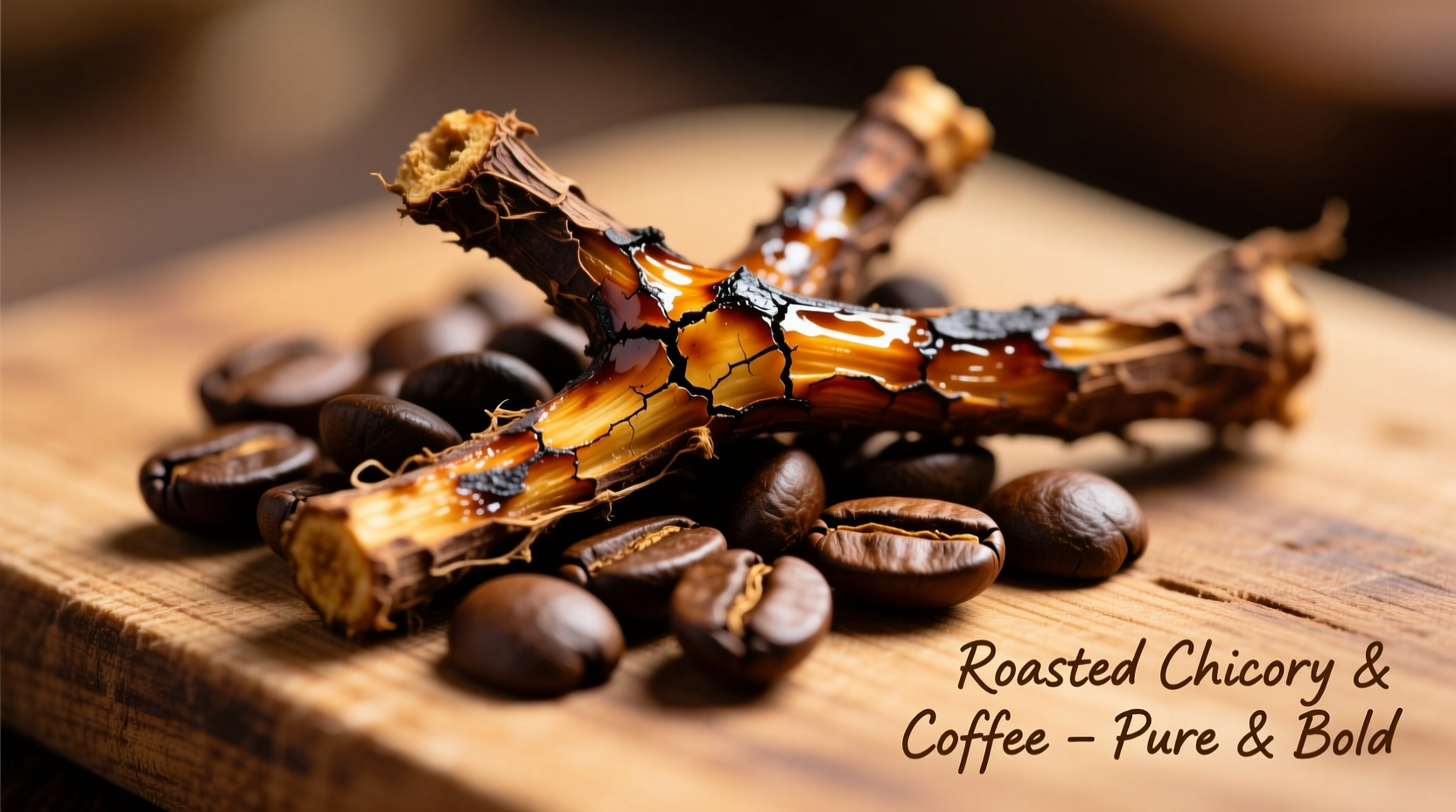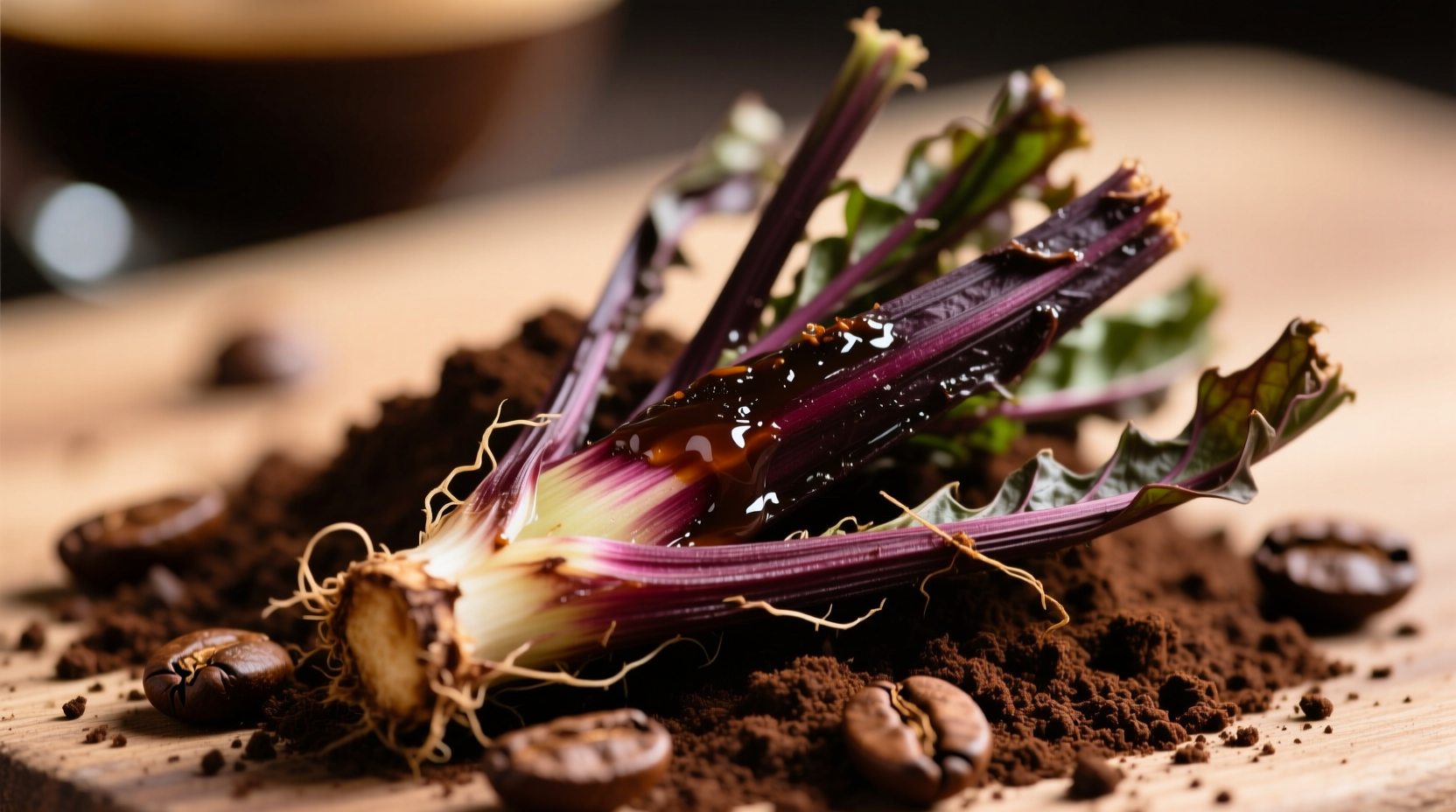Curious about incorporating chicory root into your culinary repertoire? Understanding its distinctive flavor profile is essential whether you're exploring coffee alternatives, expanding your herbal pantry, or experimenting with traditional European ingredients. This comprehensive guide breaks down exactly what to expect when tasting chicory root in various forms, helping you make informed decisions about its use in beverages and cooking.
The Fundamental Flavor Profile of Chicory Root
Raw chicory root delivers a notably bitter, slightly woody taste with earthy undertones reminiscent of dandelion greens or endive. The bitterness comes from sesquiterpene lactones, natural compounds that serve as the plant's defense mechanism. Unlike coffee's acidic bitterness, chicory's bitterness has a more vegetal quality that some describe as "root-like" or "forest floor" in character.
When roasted—a process that transforms its chemical composition—chicory root develops richer, more complex flavors. The Maillard reaction creates caramelized notes, while pyrolysis generates smoky, toasty characteristics. Properly roasted chicory achieves a balance where the natural bitterness is tempered by nutty, chocolate-like undertones without becoming burnt or acrid.
| Preparation Method | Primary Flavor Notes | Bitterness Level (1-10) | Best Culinary Applications |
|---|---|---|---|
| Raw (fresh) | Vegetal, woody, slightly sweet | 3 | Salads, roasted vegetable dishes |
| Lightly roasted | Nutty, mild coffee-like notes | 5 | Coffee blends, mild herbal teas |
| Medium roasted | Caramel, toasted grain, moderate bitterness | 7 | Standalone beverage, baking ingredient |
| Dark roasted | Smoky, intense bitterness, charred notes | 9 | Strong coffee substitutes, flavoring agent |
How Chicory Root Taste Evolves: A Sensory Timeline
Your experience with chicory root unfolds in distinct phases that differ significantly from coffee:
- Initial impression (0-5 seconds): A robust, earthy aroma hits your senses, often described as "forest-like" or "nutty" with subtle caramel notes if properly roasted
- First taste (5-15 seconds): Bitterness registers immediately on the sides of your tongue, accompanied by woody, root vegetable flavors that lack coffee's acidity
- Middle palate (15-30 seconds): Nutty, chocolate-like notes emerge as the bitterness integrates, with a heavier mouthfeel than coffee
- Aftertaste (30+ seconds): Chicory leaves a distinctive vegetal aftertaste that can linger for minutes—more reminiscent of roasted grains than coffee beans
This extended flavor evolution explains why some coffee drinkers find chicory blends satisfying for the initial experience but notice the difference in the finish. The USDA Agricultural Research Service confirms that chicory's bitter compounds, particularly intybin, have different receptor activation patterns than coffee's caffeine-related bitterness, creating a distinct sensory experience.
Practical Applications Based on Flavor Profile
Understanding chicory's taste characteristics helps determine where it shines in culinary applications:
Coffee Blending: When combined with coffee (typically 15-30% chicory), it adds body and depth while reducing overall bitterness. New Orleans-style coffee exemplifies this balance, where chicory's earthiness complements coffee's acidity. The National Coffee Association notes that proper blending requires matching roast levels to prevent the chicory from dominating the flavor profile.
As a Standalone Beverage: Dark roasted chicory makes a caffeine-free alternative that satisfies coffee cravings through similar roasting chemistry. However, those expecting identical flavor will be disappointed—chicory lacks coffee's complex acidity and floral notes. Adding a pinch of salt can help balance its bitterness, as recommended by culinary professionals at the Culinary Institute of America.
In Cooking: Fresh chicory root contributes subtle bitterness to salads and roasted dishes, while powdered roasted chicory enhances gravies, stews, and chocolate recipes with its earthy depth. Professional chefs often use it as a secret ingredient to add complexity without overwhelming other flavors.
Contextual Limitations: When Chicory Flavor Falls Short
Despite its versatility, chicory root has specific limitations based on its flavor profile:
- Acidity-dependent recipes: Chicory cannot replicate coffee's bright acidity, making it unsuitable for recipes where pH balance is crucial
- Fine coffee appreciation: Specialty coffee enthusiasts seeking nuanced floral or fruity notes will find chicory's earthy profile too dominant
- Sensitive palates: Those with heightened sensitivity to bitter compounds may find even lightly roasted chicory overwhelming
- Traditional coffee preparation: Chicory doesn't respond to brewing variables like coffee—water temperature and extraction time have less impact on final flavor
According to research published in the Journal of Food Science, chicory's flavor compounds are more stable during extraction than coffee's volatile aromatics, resulting in less variation between brewing methods. This makes it more predictable but less nuanced than coffee when adjusting preparation techniques.
Common Misconceptions About Chicory Flavor
Several myths persist about chicory root's taste that deserve clarification:
Myth: "Chicory tastes exactly like coffee but without caffeine" Reality: While roasted chicory shares some flavor compounds with coffee due to similar roasting processes, its fundamental chemical composition creates a distinctly different profile with more pronounced vegetal notes and less acidity.
Myth: "All chicory is unbearably bitter" Reality: Proper roasting significantly reduces bitterness while developing complex flavors. The bitterness level depends entirely on roast degree and preparation method—light roasts can be quite mild.
Myth: "Chicory is just a cheap coffee substitute" Reality: Culinary historians note that chicory has been valued for its unique flavor profile since ancient Egypt, long before coffee became popular. Many cultures appreciate it as a standalone ingredient with its own merits.

Maximizing Chicory's Flavor Potential
To get the best flavor from chicory root, consider these professional tips:
- Storage matters: Keep roasted chicory in an airtight container away from light—exposure to air degrades its volatile flavor compounds faster than coffee
- Grind consistency: Use a coarse grind for French press (similar to coffee), but finer for espresso-style preparations to extract maximum flavor
- Water quality: Chicory is more sensitive to water chemistry than coffee—use filtered water with moderate mineral content for best results
- Temperature control: Brew at 200°F (93°C)—higher temperatures increase bitterness extraction without adding desirable flavors
- Flavor balancing: A small amount of cream or plant-based milk reduces perceived bitterness more effectively than with coffee
Food scientists at UC Davis have found that chicory's bitter compounds are more soluble in fat than coffee's bitter compounds, explaining why dairy products have a more pronounced softening effect on its flavor profile.
Final Taste Assessment
Chicory root offers a distinctive flavor journey that stands on its own merits rather than merely imitating coffee. Its earthy depth, complex bitterness, and subtle nutty notes create a satisfying beverage experience that has endured for centuries across multiple cultures. While it shares some roasted characteristics with coffee, chicory's unique flavor profile—particularly its lingering vegetal aftertaste—makes it a distinct culinary ingredient worthy of appreciation in its own right.
Whether you're exploring caffeine-free alternatives, seeking to expand your flavor repertoire, or connecting with culinary traditions from New Orleans to Europe, understanding chicory root's specific taste characteristics helps you use it effectively and appreciate its unique contribution to the world of beverages and cooking.
Does roasted chicory root taste exactly like coffee?
No, roasted chicory root shares some coffee-like characteristics including roasted, nutty notes, but has a more pronounced earthy, vegetal flavor with a distinctive aftertaste. It lacks coffee's acidity and complex aromatic compounds, creating a different sensory experience despite similar roasting chemistry.
How can I reduce the bitterness of chicory root?
To reduce bitterness, use medium roast rather than dark roast chicory, brew at 200°F (not boiling), add a small pinch of salt to your brew, or use milk or cream which binds to chicory's bitter compounds more effectively than with coffee. Proper storage in an airtight container also prevents bitterness from intensifying over time.
Why does chicory root have a lingering aftertaste compared to coffee?
Chicory's lingering vegetal aftertaste comes from sesquiterpene lactones, particularly intybin, which activate different taste receptors than coffee's bitter compounds. These compounds have higher molecular weight and bind more strongly to taste receptors, creating a longer-lasting sensation as documented in food chemistry research from the Journal of Agricultural and Food Chemistry.
Can I use chicory root as a 1:1 substitute for coffee in recipes?
Not exactly. While you can substitute roasted chicory for coffee in many recipes, remember it lacks coffee's acidity and has different flavor compounds. In baking, use 75% chicory to 25% coffee for best results, or adjust other ingredients to balance pH. Chicory works particularly well in chocolate-based recipes where its earthy notes complement cocoa.
Does the taste of chicory root vary by growing region?
Yes, soil composition and climate affect chicory's flavor profile. Belgian and French varieties tend to be milder with more pronounced nutty notes, while Eastern European varieties often have stronger earthy characteristics. The USDA notes that chicory grown in sandy soils produces roots with lower bitterness levels compared to those grown in clay-rich soils.











 浙公网安备
33010002000092号
浙公网安备
33010002000092号 浙B2-20120091-4
浙B2-20120091-4